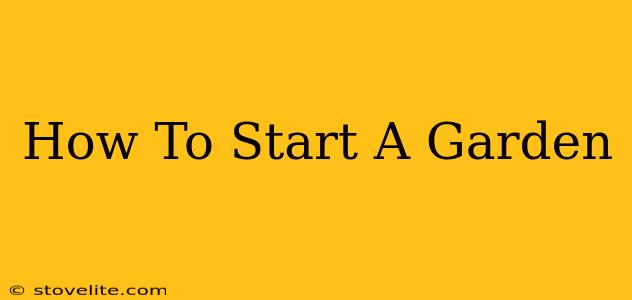Starting your own garden can seem daunting, but it's a rewarding experience that connects you with nature and provides fresh, healthy food. This guide breaks down the process into manageable steps, making it easy for even the most novice gardener to get started.
Planning Your Garden
Before you even touch a trowel, careful planning is crucial for a successful garden. This involves several key considerations:
1. Choosing Your Location: Sun, Soil, and Space
- Sunlight: Most vegetables need at least 6 hours of direct sunlight daily. Observe your yard throughout the day to find the sunniest spot.
- Soil Type: Good drainage is essential. Amend heavy clay soil with compost to improve drainage and aeration. Sandy soil benefits from the addition of organic matter to retain moisture. A soil test can provide valuable insights into your soil's pH and nutrient levels.
- Space: Start small! A small, manageable garden is better than an overwhelming large one you can't maintain. Consider the size of your space and the types of plants you want to grow.
2. Selecting Your Plants: Knowing Your Climate and Preferences
- Climate: Choose plants suited to your local climate zone. Your local garden center or agricultural extension office can provide valuable information on suitable varieties.
- Personal Preferences: What do you like to eat? Focus on growing vegetables, herbs, or flowers that you'll actually enjoy. Starting with a few easy-to-grow varieties is a great way to build confidence.
- Seed Starting vs. Seedlings: You can start seeds indoors several weeks before the last frost or buy seedlings from a local nursery. Seed starting offers more variety and can be cost-effective, while seedlings provide a head start.
3. Gathering Your Supplies: Essential Tools and Materials
- Gardening Tools: A trowel, hand rake, garden fork, and watering can are essential. Other helpful tools include gloves, a hoe, and a shovel.
- Soil Amendments: Compost, peat moss, or other organic matter will enrich your soil.
- Seeds or Seedlings: Choose high-quality seeds or healthy seedlings from a reputable source.
- Watering System: A watering can, hose, or soaker hoses are necessary for keeping your plants hydrated.
Preparing Your Garden Bed
Once you've planned your garden, it's time to prepare the soil:
1. Clearing the Area: Removing Debris and Weeds
Remove any grass, weeds, rocks, or other debris from your chosen garden location. A clean bed is crucial for healthy plant growth.
2. Till or Loosen the Soil: Improving Drainage and Aeration
Loosen the soil to a depth of 12-18 inches using a garden fork or tiller. This improves drainage and allows roots to penetrate easily.
3. Adding Amendments: Enriching Your Soil
Incorporate compost or other organic matter into the soil to improve its structure, drainage, and nutrient content.
Planting Your Garden
Finally, it's time to plant! Follow these steps for successful planting:
1. Planting Seeds: Depth and Spacing
Plant seeds at the appropriate depth and spacing, as indicated on the seed packet. Gently cover the seeds with soil and water thoroughly.
2. Planting Seedlings: Careful Handling
Carefully remove seedlings from their containers, avoiding damage to the roots. Plant them at the same depth they were growing in their containers, and water well.
3. Watering and Mulching: Maintaining Moisture and Suppressing Weeds
Water regularly, keeping the soil consistently moist but not waterlogged. Apply a layer of mulch to help retain moisture, suppress weeds, and regulate soil temperature.
Ongoing Garden Care
Maintaining your garden requires ongoing care:
- Watering: Water deeply and regularly, especially during dry spells.
- Weeding: Regularly remove weeds to prevent competition for resources.
- Fertilizing: Feed your plants with a balanced fertilizer according to package directions.
- Pest and Disease Control: Monitor your plants for pests and diseases, and take appropriate action if necessary. Organic pest control methods are often preferred.
Starting a garden is a journey, not a race. Don't be afraid to experiment, learn from your mistakes, and enjoy the process. With a little planning and effort, you can enjoy the satisfaction of growing your own food. Happy gardening!

